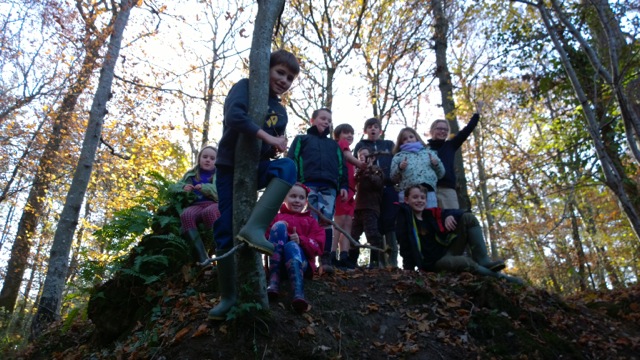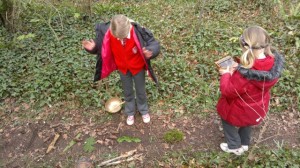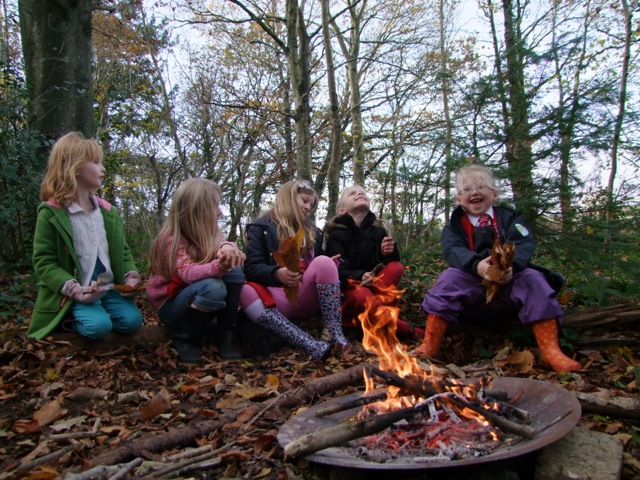Use your pupil premiums to encourage confidence and engagement while raising attainment with creative outdoor and natural learning.

The “Natural” series of Enrichment programmes, workshops and INSET training are at the leading edge of creative outdoor learning and contain my own developments of the forest school model.
I believe children learn best through play and where possible, child led play and exploration. The natural series is about learning about and connecting to self, each other and the natural environment – be it in your school grounds or a local natural environment – through playful, meaningful activity. Children often feel more able to be themselves out of the classroom. When they feel good about themselves and making valued contributions outside it helps with attainment and progress in the classroom. Outdoor activities and forest school principles combine well to help people develop leadership, citizenship qualities as well as new understanding of social and ecological dynamics.
So far enrichment sessions have been around 6 weeks long. If possible we organise a day trip to the woods or other local natural area. I like to have an award ceremony and brief presentation to the rest of the year or school at the end of the programme.
I offer these basic themes for enrichment sessions:
- Natural Musicians
- Natural Storytellers
- Natural Born Survivors
- Natural Mathematicians
- Natural Scientists
- Natural Engineers
Forest School Sessions
In 2004 I trained as a forest school leader and have been leading clubs and enrichment sessions since then. I deliver school regular ‘in timetable’ slots or enrichments sessions for particular groups of children and cn provide after school clubs as well as over camps for whole classes. Read more about forest school sessions here
Natural Musicians
The video, from a Natural Storyteller and Musicians enrichment programme in Devon Autumn 2013, shows some of the activities and the smiling faces as we played to learn, learnt through play. Based in the 1/3 acre woodland beside the school three groups of 12 children came out, whatever the weather.
Over the last couple of years I have been developing ways of using found natural objects to help compose and make music. The music is played with a combination of body percussion, beatboxing, vocals and found natural instruments like sticks and bushes. It is a way of using the outdoor classroom and meeting music curriculum elements like pulse, describing sounds, soundscapes, rhythmic patterns, working alone, composition, working as a duet, working as an ensemble. There are many links to literacy, numeracy and science too, and I think that my degree in environmental science, experience as an author and creative outdoor learning facilitator put me in a perfect place for exploring these links in ways suited to age, ability and interest. Natural Musicians makes for a fantastic INSET training too – team building, leadership, communication, creativity…its all in there in abundance!
VISIT THE NATURAL MUSICIANS WEBSITE HERE
Children and music teachers love the chance to get outside. Class teachers who have real problems reading or ‘doing’ music take to these activity ideas like ducks to water. They find their children feel more able to express themselves outdoors, enjoy making rhythms, loops and small pieces of music so easily. They can read the music, because they wrote it, and can express themselves in new ways, without being judged. They feel happy and more confident as a result. Forest school leaders and participants love it, and so have some of the corporate groups I worked with.
Natural Born Survivors
These enrichment sessions have the focus of learning the four basic survival skills of shelter building, fire making, water preparation and outdoor cooking. Activities are pitched according to age and skill, with a day out in the woods a special event whenever possible.
Natural Mathematicians
Using sticks, patterns in nature, survival and tracking skills to encourage mathematic thinking and aptitude through fun and games meaningful activities.
Natural Scientists (Ecologists)
Pitched according to key stage, this exploration of the science of the natural world is a personal favourite ( I did a degree in Environmental Science ). Ecology is such an interrelated subject…there are links to all core subject areas. Name your learning outcomes and I am sure to find activities to do!
There is more information here from previous work, or visit my blog for more recent examples!
A blog about a Natural Voice day in Sussex in pictures:
http://www.wholeland.org.uk/finding-natural-voice-workshops-for-schools/
In relation to the natural storytellers my aim was for the children to learn through the whole body learning by engaging with activities and role play, and then to reflecting on the experiences. We enacted stories, made clay characters, became reporters and explorers, and pretended to be in action movies. We finished off the sessions with some stories around a fire – and after all, isn’t the greatest gift you can give your listening? We will have to wait and see whether their writing improves! However, this is the video from the last enrichment programme at the school.
The natural musicians sessions were with KS1 children. These sessions are very much about play in the woods with drip fed mini activities to inspire the play. We find word sounds, sticks to bang tree stumps with, learnt hand clapping and body percussion rhythms and how to use found natural objects to write musical scores. It’s great fun and we finish off with some music and stories around a fire.
What are some the benefits of playing music?
- Music boosts attainment levels – Time and again music has proved to have a positive effect on all aspects of a pupil’s learning. When music is allowed to permeate the school curriculum it has a positive effect on all aspects of pupils’ learning
- Music improves learning skills – Research undertaken by the University of London has clearly demonstrated the benefits that music gives young children particularly in the younger years of Key Stages 1 and 2.
- Music fosters team working – Playing in small groups, in whole classes or in any ensemble or orchestra means you are a part of an integrated team.
- Music enhances social skills – Playing an instrument or learning to sing requires real concentration. Quietness and calm whether on stage or in the classroom is essential.
- Music underpins better behaviour – To learn music you need discipline. To play well requires regular practice and dedication. There are many occasions when music has had a transformational effect on children and helped turn their lives around.
- Music encourages creativity – Playing and composing music stimulates creativity in so many ways. It enables young people to express themselves like no other medium.
- Music is for life – An early start in music often results in music becoming a life-long passion. This gift is precious; leading to a life time of musical enjoyment.
- Music is an educational building block – Research evidence shows that a quality music education can improve self-confidence, behaviour and social skills as well as improve academic achievement in areas such as numeracy, literacy and language.’
- Music is fun – Music making is not only good for the brain but also the heart. Young People enjoy the pleasure of mastering a tune or a song and the prestige and stimulation of a first performance in front of an audience is an adrenalin rush that is never forgotten.
- Music is for everyone – Music is inclusive irrespective of ability. Studies have shown that music can be of particular benefit to children and young people in challenging circumstances – not only those with Special Educational Needs (SEN) and disabilities but also those who are marginalised, vulnerable and often hard to reach.
Watch this space because there will be some natural mathematicians and natural scientists programmes coming soon!


